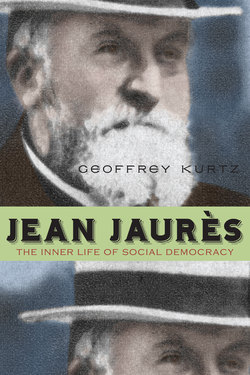Jean Jaurès

Реклама. ООО «ЛитРес», ИНН: 7719571260.
Оглавление
Geoffrey Kurtz. Jean Jaurès
Отрывок из книги
JEAN JAURÈS
JEAN JAURÈS
.....
Although he takes the actuality-potentiality distinction from Aristotle, Jaurès uses it in his own way. Aristotle wrote about the actuality and potentiality of particular beings; he wanted to understand the processes of development that beings undergo as they move through actuality toward potentiality—from acorn to oak, for instance, or from a set of people in one place to a political community. For Aristotle, actuality becomes (or can become) potentiality. For Jaurès, however, actuality and potentiality are aspects of Being as such. The relationship between the two is not one of change over time, but of permanent co-presence. “Infinite Being is not on the way to realization; it is already the fullness of Being. Infinity does not become; it is,” Jaurès writes. “The infinity of Being is present really, actually, in all fragments of reality” (PTA, 152). A pair of concepts that Aristotle used to account for growth and development becomes, for Jaurès, a way to give an account of the perpetual tension that constitutes Being. When Jaurès writes that the world’s parts all aspire to the common end of unity, beauty, freedom, and joy, he is not making a prediction about the degree to which those ends will be realized in the future; he is proposing that we can sense the presence of those ends now, in the world as we see, hear, smell, taste, and feel it. Thus the facts of conflict, ugliness, oppression, and sadness are not the last word on reality. Writing about the concept of movement, Jaurès proposes that trajectory is more significant than extent: “Every movement—whatever it is, whatever its form, its speed, its direction—is infinite since it gives form to a part of Being; Being is homogenous and singular, and so every one of its parts shares in its infiniteness. Every movement is thus infinite from the point of view of Being and of Being’s potentiality; it is so also from the point of view of Being’s form and Being’s actuality. . . . Each form of movement expresses in its own way the universal system” (PTA, 173–74). Thus, if we want to look for infinity—that is, for the potentiality of Being—we need not look elsewhere than the finite and particular organized systems and instances of movement that we meet in the sensible world. Every form, every organization, every movement intimates the unity, beauty, freedom, and joy that are the purpose of Being. The potentiality of Being is not to be waited for, but to be recognized here and now, in real spaces and at the present time. If we enter into the limited movements and not quite harmonious relationships of the world that surrounds us, we will not be distancing ourselves from the “ideal end” or “divine end” of Being. To pursue the ideal is not to depart from the sensible world, but to comprehend it. To take seriously the sensible world is not to neglect the ideal, but to find it.
Turning from the vocabulary of classical Greek philosophy to the vocabulary of biblical religion, Jaurès at times uses “Dieu” as a synonym for “l’être.” Twice, he quotes Paul’s “in God we live, and move, and have our being” (PTA, 154, 347).47 and he writes: “God, or Being, is at the same time, and in an indestructible unity, both actuality and potentiality” (PTA, 129). Jaurès’s God is not a self-contemplating “idol of perfection” like the god of Plato and Aristotle, but is active and “present in our struggles and in our sadness, in all struggles and all sadness.”
.....